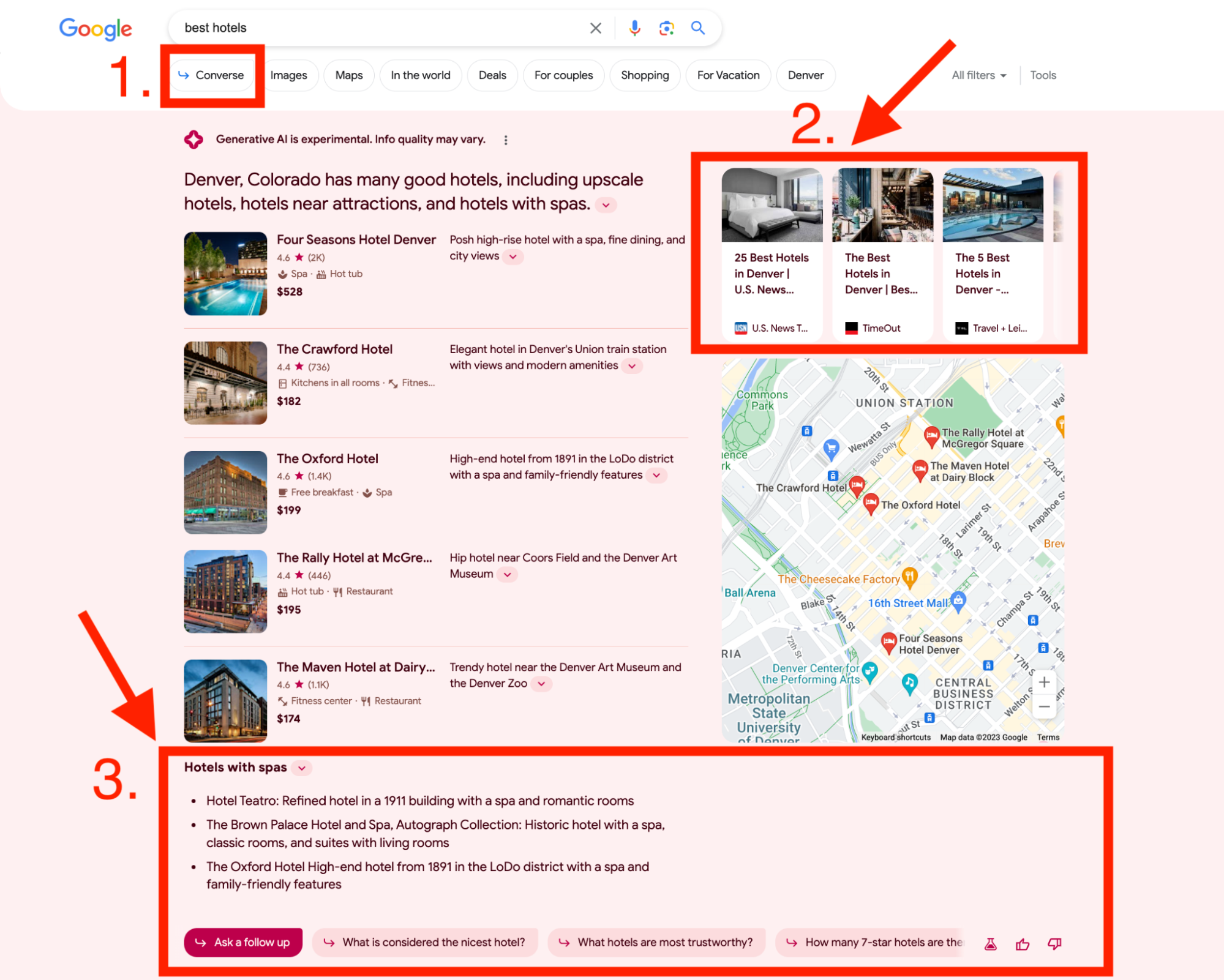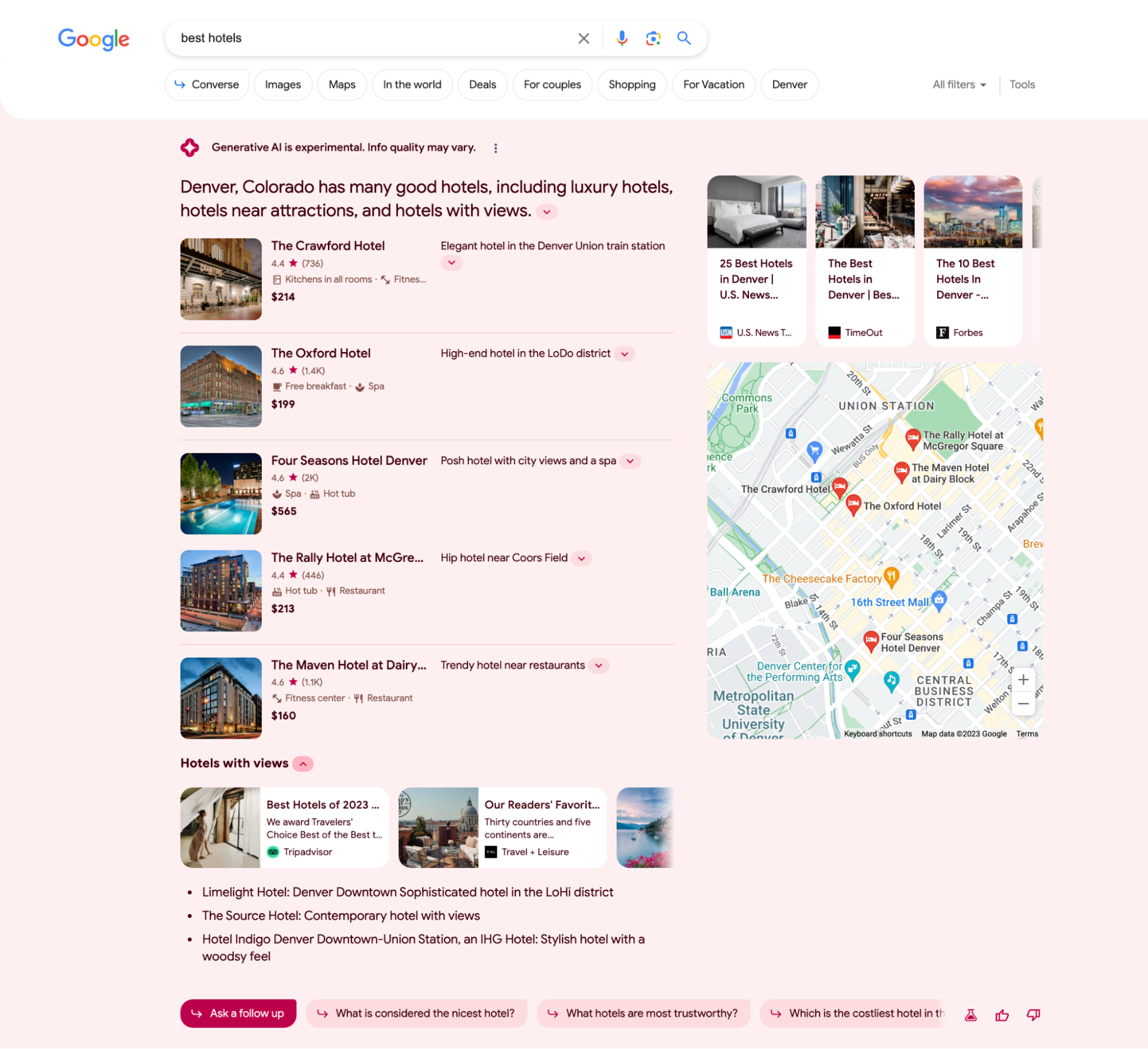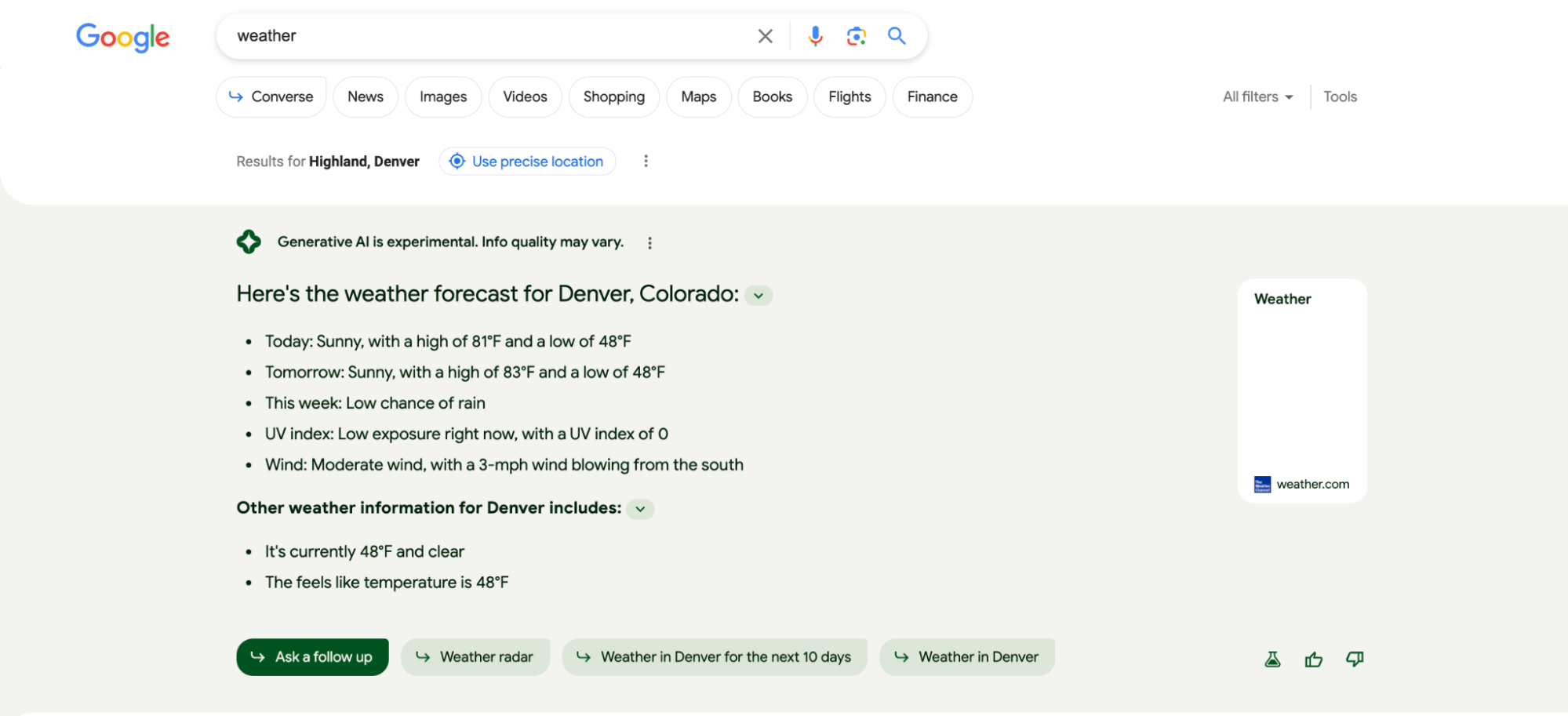
Every edge of our digital world is evolving at warp speed, thanks in no small part to the release of AI into the wild. The science of “search” is no exception.
Understanding the internal workings of search engines has long been a key component to a hotel’s digital success, and hospitality brands with a mastery of search hold a considerable advantage.
Google is poised to usher in the latest, AI-infused evolution of search with its Search Generative Experience, more simply known as SGE, which is widely expected to revolutionize how we look for and find information.
The Screen Pilot team has early access to SGE, and has been actively testing the platform for several months to best prepare our hotel partners for continued success in search. This post is meant as an update to our hospitality industry partners. We’ll outline SGE’s significance, implications, and suggest updated strategies for optimal SEO performance.
It’s important to keep in mind that SGE is still in a developmental phase, and while SGE is certainly making waves, there’s still a lot we have yet to learn as Google actively experiments and tests the AI-powered product ahead of officially rolling it out to all users. This post is meant as a starting point for hotel and resort teams to better understand Google’s SGE and the future of search.
What is Google’s SGE?
SGE is an early step in transforming the Search experience with generative AI. When using SGE, people will notice their search results page with familiar web results, organized in a new way to help them get more from a single search.
When will Google’s SGE officially launch?
Google is currently testing SGE and how it presents results and prioritizes driving traffic to websites. As of this writing, no formal launch date has been announced, though Google has indicated that SGE will be rolled out first in the U.S.
Understanding the Search Generative Experience (SGE)
The Search Generative Experience revolutionizes search results presentation, complementing traditional organic search and represents a significant leap in search technology. This upgrade transforms search results into a more conversational experience, where Google comprehends and accelerates your search.
Integrating SGE into hotel and resort SEO strategy will enhance the guest experience. Unlike traditional search algorithms that rely on predefined criteria, SGE leverages advanced machine learning models to dynamically generate results based on a user’s context, preferences, and search history.
Let’s take a breakdown of what an SGE search looks like:

- Converse Feature: The converse feature enables you to engage in a conversation with Google, facilitating the retrieval of desired information and retaining context from previous interactions.
- Authoritative Sources: Google’s SGE doesn’t autonomously generate these responses. It leverages high-authority and well-ranked content within its index to inform its AI generation, guiding users effectively. Essentially, it offers SEO experts insights into what Google deems as exceptional content beyond organic search results.
- Related information: Google will suggest related search items that might pique your interest based on your query. It can also provide additional information on those suggestions and other related searches. However, the most crucial aspect is the option to express approval or disapproval of responses. This not only aids Google in optimizing SGE, but it also has the potential to learn from your preferences and dislikes in order to deliver the most personalized and optimal results for you.
Note: SGE is currently in a testing phase, suggesting that further changes and enhancements will likely occur. It raises important questions about the evolution of SGE and its potential impact on SEO reporting strategies.
Testing the Waters: How SGE Delivers Specific Searches
To truly grasp SGE’s impact, experiments are essential to understanding exactly how SGE customizes results for distinct user contexts. This helps to fine-tune search strategies and clarifies when to deploy SGE for optimal outcomes.
Here is what we found.
Key Components of SGE:

- Contextual Awareness: SGE considers location, device, and recent searches for tailored results. For instance, if you’re searching for “best hotels,” SGE will provide options based on your current location. This ensures that you receive relevant results in your vicinity.
- Reviews Will Matter More Than Ever: Let’s take a further dive into the above visual example for an SGE search for “best hotels.”
Notice anything interesting? We didn’t get a review below 4.4 stars.
This goes to show Google will be rewarding brands who are highly reputable from public reviews and have exceptional content that matches the search.
- Dynamic Ranking: SGE adapts in real-time, akin to a chef adjusting a menu based on seasonality and the freshest ingredients. This means that the search results may change based on the time of day, trending topics, or user behavior. As an example, when searching “weather,” SGE will provide real-time updates on the weather.

In its current instance, SGE is taking up more space in search results and has been observed to show fewer ads. SGE is currently in a testing phase, suggesting that further changes and enhancements may occur in the future. It raises important questions about the evolution of SGE and its potential impact on paid ad strategies.
Optimal Use Cases for SGE in Hospitality
In hospitality, strategic use of SGE can be transformative. Based on our research, SGE excels in the following scenarios:
- Complex or Specific Queries: Imagine a guest looking for a highly specific amenity, like “hotels with rooftop pools in Miami.” SGE will generate a list of all hotels that mention rooftop either on the website or through reviews that are tailored to this specific query, ensuring the guest finds precisely what they’re looking for as quickly as possible.
- Localized Searches: When guests are looking for nearby attractions, restaurants, or services, SGE tailors results based on their current location. This enhances their experience with relevant options in proximity to their stay.
- Ever-Changing Topics: In the dynamic world of hospitality, trends and offerings are constantly evolving. SGE adapts to provide up-to-the-minute information on events, promotions, or new amenities. Whether it’s a last-minute deal or an impromptu event, SGE ensures users are always in the loop.
SGE is invaluable for precision and timeliness. Whether guests seek real-time information, specialized details, or local services, SGE delivers exactly what they ask for, on demand.
Practical Applications of SGE in Hospitality
To stay competitive, hotels and resorts will need to embrace the SGE paradigm. Here’s how you can optimize your hospitality offerings through SGE:
- Keep Content Relevant and Fresh: When it comes to hotel marketing, content has long been considered king, and content will continue to reign supreme in SGE. Regularly update your website with dynamic, evergreen content that provides genuine value to guests. SGE favors this type of material. For example, if you’re a hotel in a popular vacation destination, regularly updating your website with information about local events, attractions, and seasonal offerings can enhance your visibility in SGE-generated search results.
- Localize Your SEO Strategy: Customize your website content to spotlight the unique experiences and amenities your establishment offers in its specific region. SGE recognizes and rewards content that caters to local interests, boosting your visibility in localized searches. For instance, if your hotel offers a special package for guests to explore nearby attractions, make sure this information is prominently featured on your website.
- Facilitate Guest Interaction: Encourage guests to engage with your establishment through feedback, reviews, and social media interactions. SGE values genuine guest engagement, potentially leading to increased visibility in search results. When guests leave positive reviews about their experience at your hotel, this not only improves your online reputation but also signals to SGE that your establishment is a trusted and valued option for travelers.
Screen Pilot’s Perspective: SGE’s Impact on Hospitality Searches
After two decades in hospitality marketing, Screen Pilot provides unique insights into how the Search Generative Experience (SGE) influences branded and unbranded searches in the hospitality industry.
- Branded vs. Unbranded Searches: With SGE, branded searches (those including a hotel’s name) may yield enhanced results, providing more comprehensive information about the property. Unbranded searches (queries without a specific hotel in mind) also benefit from SGE’s ability to deliver relevant results based on user intent and location, especially concerning vacation inspiration. For example, if a user searches for “luxury hotels in [destination],” SGE may display a carousel of high-end hotel options with detailed information.
- Enhancing Accessibility of Hotel Information: SGE offers creative opportunities for hotels to present vital information to potential guests based on branded searches. Details like check-in and check-out times, available amenities, room types, and special accommodations for various traveler types can be prominently featured in search results, enhancing user convenience. For example, when a user searches for “check-in time at [hotel],” SGE may display a direct answer with the check-in time prominently highlighted.
- Tailoring Recommendations: SGE enables more personalized recommendations based on user preferences and travel needs. Whether a guest is seeking a family-friendly suite, a pet-friendly room, or an accessible option, SGE ensures that the most suitable accommodations are prominently displayed. If a user searches for “pet-friendly hotels in [destination],” SGE may generate results specifically highlighting hotels with pet-friendly policies.
Fresh Questions and Final Thoughts
After a significant amount of time with SGE, our team has come away with as many questions as we did answers.
How will SGE integrate paid ads?
What will Google’s reporting look like for tracking SGE-generated results?
How will Google My Business listings relate to the SGE experience?
How does SGE adapt to emerging technologies or changes in user search behavior over time?
What we know for sure is that embracing SGE will open doors to a future where hotels can deliver richer, more relevant information directly within search listings, enhancing the user experience and benefiting both hotels and travelers alike.
While the current chapter on search is still being written, the hotel and resort teams who are following along in real time will be best positioned for search success, regardless of what the future holds.
___
Like hospitality marketing insights?
Sign up to receive the UNPACKING with Screen Pilot newsletter for original inspiration delivered to your inbox.
If you’re looking to improve your hotel’s digital presence, look no further than Screen Pilot. Hotel teams that use Screen Pilot’s DBX strategy consistently enjoy overperformance in KPIs, including an increase in conversion rates between 3X and 6X their previous average.






